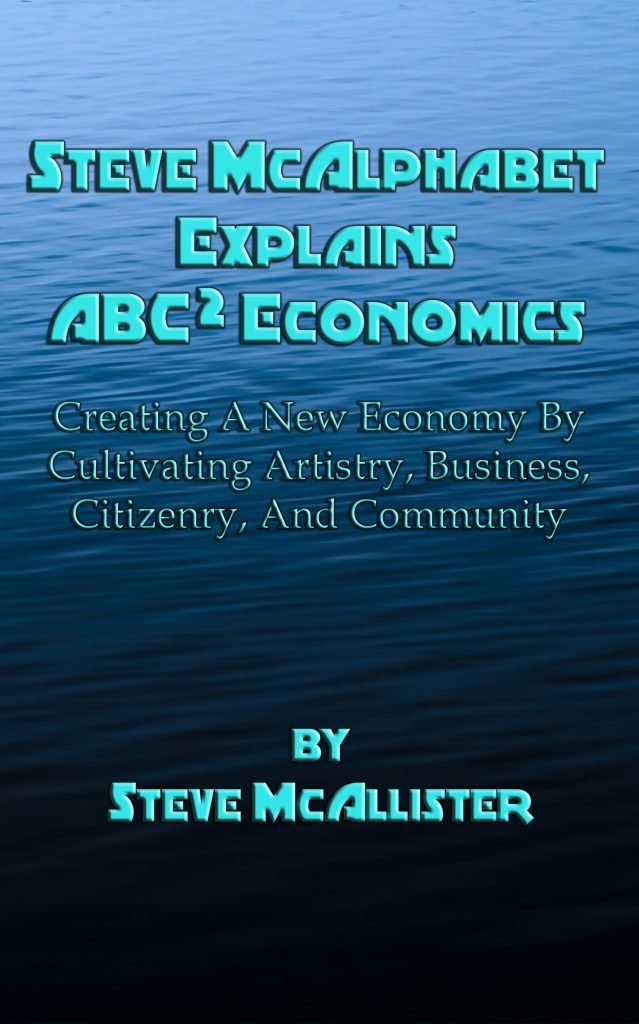Although it is often seen as the guiding light in our journey of endless growth, there is not enough reliable information available to truly confirm that the invisible hand Adam Smith mentioned only three times in his writings isn’t just as capable of flipping us off as it is to enable the mental illness we’ve come to embrace.
Along with that mental illness comes the additional diagnosis of belief in a supernatural free market, where the machines of our kingdoms and corporations can ravage the commons that belong to our collective species and the other inhabitants of this planet in order to turn them into money and never have to pay any reparations or provide any regenerative activity by which the damages and injuries related to their activity can be repaired and healed. The religion of the “free market” and its invisible hand should be separated from the state along with every other church.
For although its adherents declare capitalism to be the best economic system ever, even its greatest proponents had issues with it. For instance, even though John Maynard Keynes, known as the father of modern economics, felt that capitalism was the best system to achieve a civilized economic society, he also recognized that its failure to provide for full employment and the inequitable distribution of wealth and incomes were major faults. He also recognized that its fallibilities would one day bring its demise.
“When the accumulation of wealth is no longer of high social importance, there will be great changes in the code of morals,” Keynes wrote in Economic Possibilities for Our Grandchildren. “We shall be able to rid ourselves of many of the pseudo-moral principles which have hag-ridden us for two hundred years, by which we have exalted some of the most distasteful of human qualities into the position of the highest virtues. We shall be able to afford to dare to assess the money-motive at its true value. The love of money as a possession — as distinguished from the love of money as a means to the enjoyments and realities of life — will be recognized for what it is, a somewhat disgusting morbidity, one of those semi-criminal, semi-pathological propensities which one hands over with a shudder to the specialists in mental disease.”
Unfortunately, the accumulation of wealth did not fall by the wayside as Keynes had hoped. Instead, it has become the most important driver of our economy, so much so that although the system does still seem to work for those with a love of money as a possession, it is not doing enough to actually provide for the well-being of the populace.
As Noam Chomsky stated in an interview with David Barsamian, “There is tons of work to be done, and lots of people who would like to do the work. It’s just that the economic system is such a grotesque catastrophe that it can’t even put together idle hands and needed work, which would be satisfying to the people and which would be beneficial to all of us. That’s just the mark of a failed system. The most dramatic mark of it.”
While many people have been very well trained to acknowledge that the system we have is the best system ever (and some even follow those boasts with high fives), the truth is that our system is incredibly fallible, right down to its roots. And we are going to have to give some serious thought about how we would like to move forward from here.
“Here’s the essential point,” writes Gar Alperovitz in What Then Must We Do? Straight Talk About The Next American Revolution, “a system problem – as opposed to your usual garden variety political problem – is one that isn’t going to go away through politics as usual. It will require somehow changing the way things are rigged deeper down in the machinery of institutions, corporations, bureaucracy, and all the other elements of the system that produce the outcomes we experience. A system problem is difficult. It runs deep.”
Considering the depth of our problem, the easiest thing to do is to ignore it and just uphold the status quo. After all, facing this problem is going to take some hard work, not only on the systemic level, but at the deep, interpersonal level as well. As many have done in the past, many would rather just shrug it off and do nothing but toe the line.
“All of us have a vested interest in pessimism,” continues Alperovitz. “We don’t have to do anything if nothing can be done!”
Again, we’re human. Mistakes are in our methodology. However, it is not too late for course correction. If we’re secure enough to accept that the system we’ve invested our time and talents into isn’t perfect, then we should be able to open up to the idea that there could be a better way. As long as we open up to that possibility, then a better way is possible. But if we can’t even imagine it, then it probably isn’t there.
To find the answer we’re looking for to our global problem, we’re going to have to start looking closer to home. While the soft science of economics is indeed impressive, and offers many large numbers to impress the simple-minded, the true art of living starts where you are. To truly face the challenges before us, we have to face the challenges before us. That means starting in our own lives and our local communities instead of relying on the trickle-down assistance we’ve so often been promised but never fully received.
“We must learn to think in terms of an articulated structure that can cope with a multiplicity of small-scale units,” says Ernst F. Schumacher. “If economic thinking cannot grasp this it is useless. If it cannot get beyond its vast abstractions, the national income, the rate of growth, capital/output ratio, input-output analysis, labour mobility, capital accumulation; if it cannot get beyond all this and make contact with the human realities of poverty, frustration, alienation, despair, breakdown, crime, escapism, stress, congestion, ugliness and spiritual death, then let us scrap economics and start afresh.”
Since the word homo sapiens is translated to mean “wise person”, it is high time we started practicing more wisdom while this planet still continues to entertain this species. Should we continue in our agreement, acquiescence, and apathy toward the systematic destruction of the human race by making the majority of us unable to live our best lives in the present or unable to live at all in the future, the planet will certainly not remember us as wise persons, but merely a pesky population of parasites that came and went like a rash as it makes its way through another rotation of the universe. We would be wise to realize that we don’t need to live this way.
This is an excerpt from the book Steve McAlphabet Explains ABC Squared Economics. Go to https://stevemc.xyz/books/steve-mcalphabet-explains-abc-squared-economics/ to find out more.



